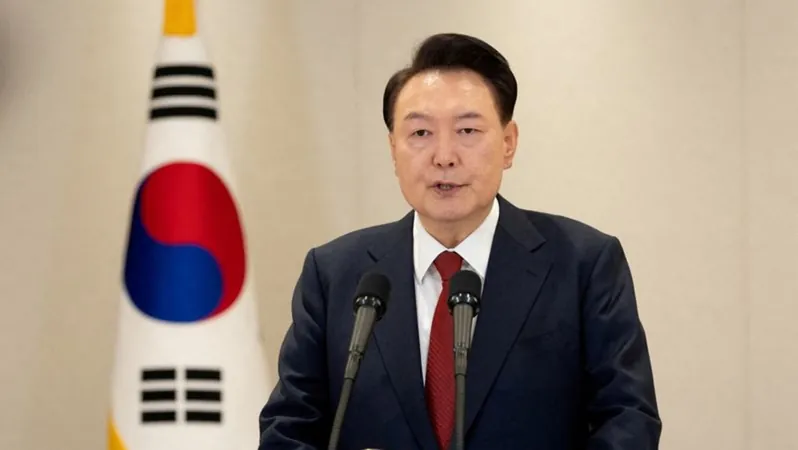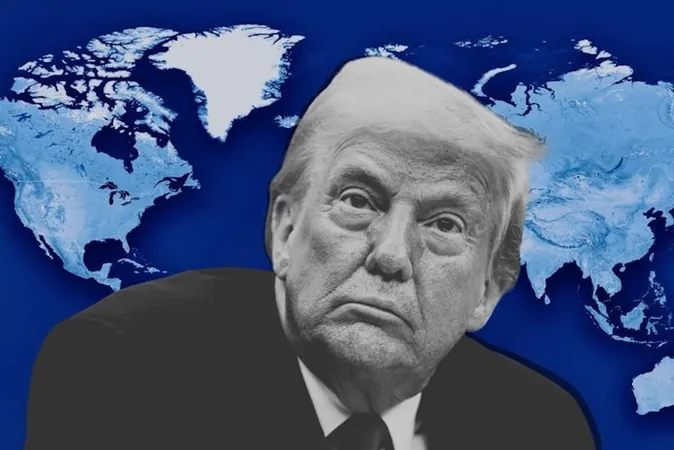
Unprecedented Legal Crisis: South Korea Seeks Arrest Warrant for President Yoon Over Martial Law Controversy
2024-12-30
Author: Yu
SEOUL – In a historic move, South Korea's joint investigation unit has officially requested an arrest warrant for suspended President Yoon Suk Yeol, following his controversial declaration of martial law this month.
This unprecedented action marks the first time a sitting president in South Korea faces the prospect of arrest, igniting widespread concern among citizens and international observers alike.
Multiple summons for questioning have gone unanswered by Yoon, which has raised eyebrows among legal experts and political analysts.
Authorities are investigating whether his Dec 3 martial law declaration could be interpreted as insurrection—a serious charge for which South Korean presidents do not enjoy immunity.
Yoon Kab-keun, representing the suspended president, has contested the authority of the Corruption Investigation Office for High-ranking Officials to probe insurrection-related offenses, asserting that the inquiry oversteps legal boundaries.
The dramatic martial law imposition lasted mere hours, during which heavily armed troops confronted parliament staff who resisted with fire extinguishers.
The swift backlash from lawmakers culminated in a vote to annul the decree, forcing Yoon to reverse his decision.
This incident has enflamed tensions in a country that has maintained a democratic government since the 1980s, triggering alarm among key allies, including the United States.
As the scandal unfolds, the Constitutional Court is engaged in a trial that will determine Yoon's fate—either reinstatement or permanent removal from office.
Critical deadlines loom, as the court has 180 days to render its decision.
During a preparatory hearing last Friday, Yoon's defense team sought a delay to strategize but was denied.
The court's insistence on expedience indicates that the implications of this case are far-reaching not only for Yoon but also for the future of democracy in South Korea.
The next hearing is scheduled for Jan 3, and analysts are closely monitoring the situation, speculating on potential ramifications for political stability and governance in the nation.
South Koreans are left to wonder how this unprecedented scenario will reshape their political landscape and what it means for their democracy.
As events rapidly evolve, one thing is clear: the world is watching closely.





 Brasil (PT)
Brasil (PT)
 Canada (EN)
Canada (EN)
 Chile (ES)
Chile (ES)
 Česko (CS)
Česko (CS)
 대한민국 (KO)
대한민국 (KO)
 España (ES)
España (ES)
 France (FR)
France (FR)
 Hong Kong (EN)
Hong Kong (EN)
 Italia (IT)
Italia (IT)
 日本 (JA)
日本 (JA)
 Magyarország (HU)
Magyarország (HU)
 Norge (NO)
Norge (NO)
 Polska (PL)
Polska (PL)
 Schweiz (DE)
Schweiz (DE)
 Singapore (EN)
Singapore (EN)
 Sverige (SV)
Sverige (SV)
 Suomi (FI)
Suomi (FI)
 Türkiye (TR)
Türkiye (TR)
 الإمارات العربية المتحدة (AR)
الإمارات العربية المتحدة (AR)